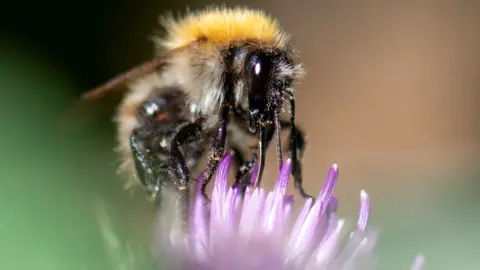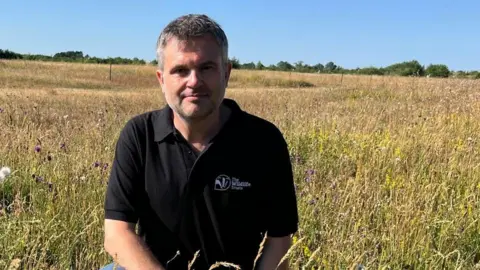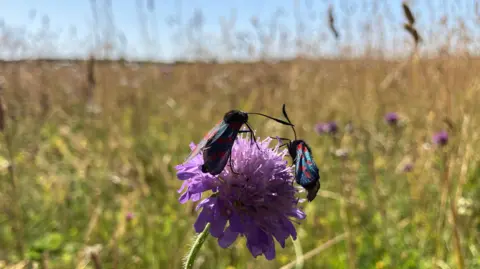Heatwave drying out grasses and hitting wildlife
 Getty Images
Getty ImagesThe June heatwave has had a big impact as the grasses that insects depend on for food have dried out, according to a conservation expert.
Craig Bennett, chief executive of The Wildlife Trusts - a federation of 46 independent wildlife conservation charities - said the ground was parched in many areas, including Trumpington Meadows, near Cambridge.
"The fact that they are drying out at least a month or so earlier than they normally would do is a real problem for wildlife," he said.
Peterborough-based charity Buglife said it was too early to assess the exact impact but "anecdotally lots of people have reported seeing more dead bees on the ground than usual".
Iain Webb, from The Wildlife Trust in Cambridgeshire, described grasses at the meadows as dry, brown and unpalatable.
"You would expect that in late July, early August - but it's the end of June, so it's much sooner than expected for a lot of these plants," he said.
"They would usually be rich and green, still palatable to most of these insects.
"There are less of them and this isn't a good sign... with reduced numbers already this year it is making it even worse for them."
Mr Webb said the dried grass meant some insects could not get the food they needed.
He added the regularity of extreme weather did not give insect numbers a chance to return to the level needed for their survival.
 Colin Mackay/BBC
Colin Mackay/BBCOther pressures facing insect populations included pesticide use, low water levels in rivers and pollution, Mr Bennett added.
"[The heatwave] comes on top of all the other pressures on our wildlife, making it much harder for wildlife to recover."
 Colin Mackay/BBC
Colin Mackay/BBCBuglife's Paul Hetherington said extreme heat particularly hit bumblebees and wasps.
"Anecdotally, lots of people have reported seeing more dead bees on the ground than usual.
"Bumblebee activity changes so that they are only out and foraging in the early morning and late evening when the temperature is at its lowest.
"The other factor from prolonged heat is that flowers mature and die very quickly, meaning after an initial pollen and nectar glut there is famine.
"The other issue with the heatwave earlier in the year is that most nests are still establishing, so have lower numbers of workers - putting the colony at risk if there is higher than usual mortality induced by the heat."
He said the public could help by providing water in shallow-sided bird baths, garden ponds or saucers.
Follow Cambridgeshire news on BBC Sounds, Facebook, Instagram and X.
